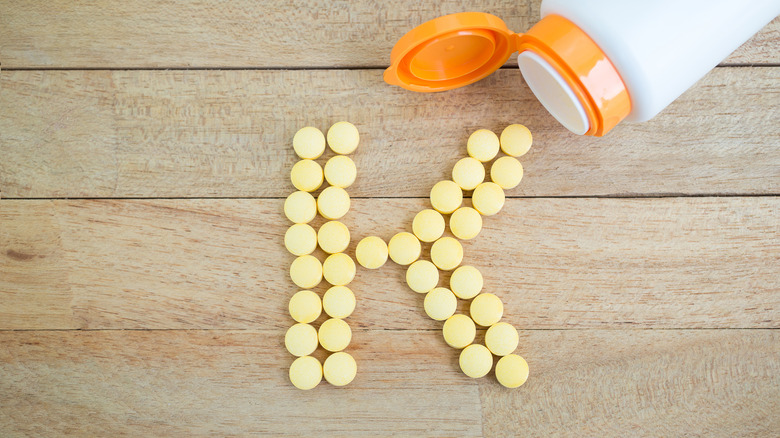You're Low On Potassium If This Happens To You
Potassium is a vital nutrient — a mineral and electrolyte. Potassium helps your heart beat regularly, manages nerve function and muscle contraction, puts nutrients in your cells while removing waste, and can help keep your blood pressure at a healthy level (via MedlinePlus). According to WebMD, you can usually get enough potassium through your diet, and not getting enough potassium because of your diet is rare.
The medical term for low potassium is hypokalemia. Normal blood levels of potassium in adults are 3.5 to 5.1 millimoles per liter or mmol/L. According to the Cleveland Clinic, anything below 3.5 mmol/L is low, and anything below 2.5 mmol/L is severe.
Symptoms include problems with your muscles, like not being able to move them; twitching; cramping; weakness; kidney problems; or an irregular heartbeat. According to Healthline, other symptoms are fatigue, bloating, constipation, stiff muscles, numbness and tingling in your extremities, trouble breathing, and changes in your mood. However, you might not have any symptoms if your potassium deficiency is mild.
If you have these symptoms, call your doctor right away. First, your doctor should order a blood test to determine potassium levels. You might also be asked to do a urine test or an echocardiogram to check your heart. The next step is the treatment to get your potassium up.
Treatment for low potassium
A 2016 study published in Nutrients states that only about 3% of American adults get enough potassium. Still, there are different recommendations — the U.S. Department of Agriculture recommends adults get 4700 milligrams of potassium a day. In contrast, the World Health Organization recommends adults get 3150 milligrams of potassium a day.
Your doctor will determine what's causing your low potassium levels and choose the treatment from there. Causes could be medications — diuretics, water pills, or antibiotics; problems with your adrenal gland; chronic kidney disease; excessive alcohol use; taking too many laxatives; folic acid deficiency; diabetic ketoacidosis; or excessive sweating, according to the Mayo Clinic. These are the most common causes of low potassium levels. However, it's essential to consult your doctor since there might be another less-common cause. Severe potassium deficiency can be fatal, which is why you must contact your doctor immediately if you have symptoms of low potassium levels, according to MedlinePlus.
While your doctor is figuring out the underlying cause of low potassium, they might temporarily prescribe a potassium supplement via pill or IV to get your levels back to normal, especially if the problem is severe. Once your levels are back up, you can get your potassium from a healthy diet filled with whole foods, especially fruits and vegetables.


